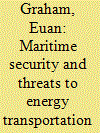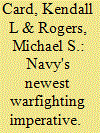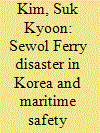| Srl | Item |
| 1 |
ID:
127726


|
|
|
|
|
| Publication |
2014.
|
| Summary/Abstract |
Achieving maritime safety would entail ensuring that the laws and regulations which govern the operations of sea-borne craft are adhered to. The Indian Coast Guard has so far not been seen to play any role in this area. It has been the exclusive preserve of the Director General of Shipping who operates through the regional Maritime Marine Departments. The situation is quite different with the US Coast Guard which actively monitors this aspect in the US waters. The US Coast Guard boards vessels for wide ranging inspections including the conduct of safety drills. Vessels found deficient in any area are liable to be detained. Serious infringement can lead to imposition of penalties. They also keep a historic record of such inspections which classifies ships according to country of registry, the company to which she belongs and the result of inspections. When a higher than normal proportion of ships of a country or a particular company are found to be deficient, the rest of the ships of the country or company are highlighted for more intensive scrutiny.
|
|
|
|
|
|
|
|
|
|
|
|
|
|
|
|
| 2 |
ID:
137942


|
|
|
|
|
| Summary/Abstract |
Southeast Asia contains some of the world's busiest and most strategic chokepoints for maritime commerce, making it a sub-region of global strategic interest. Yet the vital energy shipments through the region are subject to potential disruption caused by maritime safety challenges, legal-passage regimes, piracy and terrorism, and inter-state conflict. In addition, potential counter-trends could transform the prevailing eastward flow of energy from the Gulf, via Southeast Asia, to the major East Asian importing countries. Nonetheless, Euan Graham argues, the security of maritime shipments in Southeast Asia and its extended region is surprisingly robust, while the energy trade itself is evolving dynamically in response to shifting patterns of supply and demand.
|
|
|
|
|
|
|
|
|
|
|
|
|
|
|
|
| 3 |
ID:
124102


|
|
|
|
|
| Publication |
2012.
|
| Summary/Abstract |
The article focuses on the January 2012 guidance Sustaining U.S. Leadership: Priorities for 21st Century Defense, the 2012 Chairman's Strategic Direction for the Joint Force, and the Chief of Naval Operations' Sailing Directions and Navigation Plan, for the requirement of dealing with the cyber threat. It is stated that for this optimizing information is critical to the U.S. Navy's core capabilities including forward presence, sea control maritime security and humanitarian assistance.
|
|
|
|
|
|
|
|
|
|
|
|
|
|
|
|
| 4 |
ID:
188878


|
|
|
|
|
| Summary/Abstract |
Recent legal theories and state practice have tended to expand the conceptualization of maritime security beyond the traditional security field to encompass nontraditional security issues such as economic growth, environmental protection, and the optimal use of ocean resources. In this context, the conceptualization of maritime security in China has also undergone profound changes that have significantly influenced China’s revision of maritime traffic safety legislation. The objectives of this article are to examine the specific institutional changes in China’s new regulatory framework for maritime traffic safety, and to explore their potential implications. This article uses normative analysis to conduct a comprehensive analysis of the institutional developments in China’s new maritime traffic safety legislation, discusses how the evolution of the concept of maritime security has theoretically affected these institutional developments, and explores the potential implications of the new legislation for China’s navigational safety governance, maritime law enforcement, and cross-border maritime security cooperation.
|
|
|
|
|
|
|
|
|
|
|
|
|
|
|
|
| 5 |
ID:
094095


|
|
|
| 6 |
ID:
142290


|
|
|
|
|
| Summary/Abstract |
The sinking of the Sewol ferry on April 16, 2014, in Korea, the deadliest peacetime maritime accident in decades, was caused by a variety of factors, including human error and institutional and legal deficiencies. This article reviews the incident and its consequences.
|
|
|
|
|
|
|
|
|
|
|
|
|
|
|
|